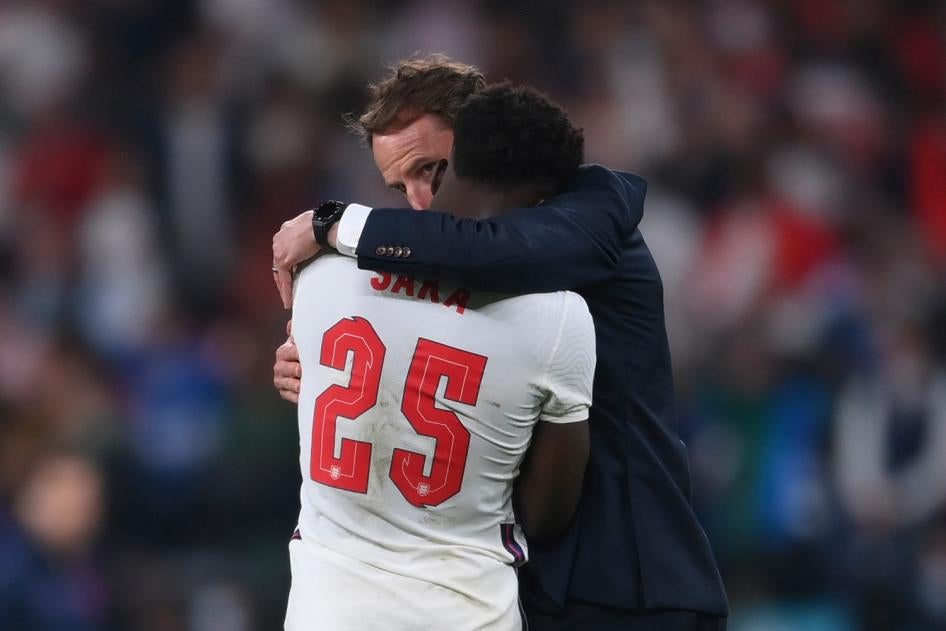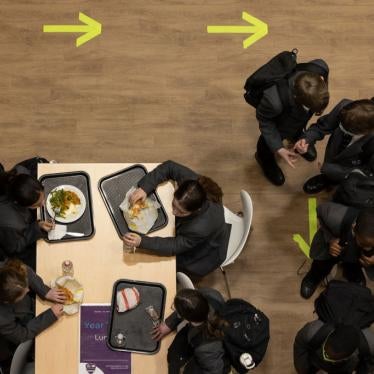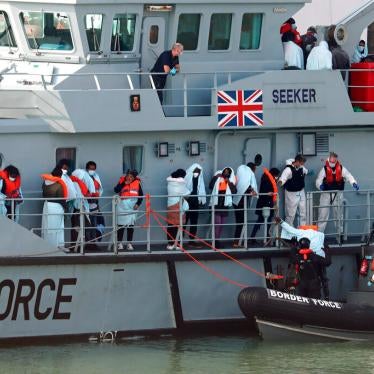As England played Italy in the Euro final, optimistic chants of “it’s coming home” turned to anxious thoughts of “I need to get home safely” for Ryan Rogers and his friends.
Ryan, a young Black British Macclesfield FC Player and loyal Three Lions fan, knew instantly what it meant when Bukayo Saka, a Black English player, failed to deliver a penalty shot for England. It meant that the color of their skin put them at risk of racist violence on the streets of Britain.
“My mum called and asked where I was and to make sure I got home safely,” Ryan told me. “If it was a white player that failed to kick the penalty shot, I wouldn’t have been worried about my safety.” It also reminded him that unlike the football pitch, there is no such thing as a level playing field in British society. If you are black, Ryan said, “you have to work 10 times harder because of the color of your skin”.
Ryan’s sentiments are borne out by the statistics. Black Britons are nine times more likely to be stopped and searched, and four times more likely to have force used against them by police than a white person. According to Youth Justice Board research, a Black British child is four times more likely to be arrested, and three times more likely to be given a caution or sentence. A 2019 Timpson Review found that if you are a Black British Caribbean student, you are nearly twice as likely to be excluded from school.
Black Britons are also disproportionately represented in the prison population and continue to die at disproportionate rates in custody, according to the Joint Committee on Human Rights, which also made clear that if you are a Black British woman you are five times more likely to die in childbirth.
Structural racial inequalities have time and again been found to be baked into British state institutions and processes that span all spheres of life. Despite this stark reality, and the global reckoning on racial justice, accelerated following the murder of George Floyd in the US, the UK government refuses to even acknowledge the depths of this structural and systemic racism – let alone adequately address it.
Instead, it commissioned a report that whitewashed the existence of structural racism in the UK, rather than implement multiple existing reports that provide a roadmap for improving the state response to racism including in the criminal justice system and immigration. UN experts described the report as “a politicized erasure of the racialized realities Black Britons navigate”. This is coupled with the government’s apparent attempt to tarnish the Black Lives Matters protest movement, with the home secretary calling the England football team taking a knee “gesture politics”.
Ryan believes this is typical of the structural racism he encounters everyday. “This makes me feel ashamed,” he said. “I have just got to the point that now I just accept it. It is what it is. But we shouldn’t have to accept it.”
If there is any reason to be cautiously optimistic, it can be found in the fact that in the face of racist vitriol directed at Saka, Marcus Rashford and Jadon Sancho, other members of the British public spoke up. As with the team that took England to the first final in 55 years, they affirmed that diversity is a hallmark and a strength of modern British society.
A test of Britain’s commitment came recently in the form of the United Nations’ call for a global transformative agenda on racial justice and equality for Africans and people of African descent globally. Off the back of this, UN experts called for an independent global inquiry into systemic racism and police violence in relation to people of African descent.
The UK, a former colonial power that reaped the benefits of the racial injustice, including the transatlantic slave trade, initially led the charge in undermining and derailing the proposal. In contrast, the US, with its own mountain to climb to address structural racism and police brutality, finally recognized the positive role a global UN inquiry could play and the Biden administration invited UN experts on racism to visit the US.
In the eleventh hour, the United Kingdom government begrudgingly made a sharp U-turn and announced it would support the independent body and the UN resolution that gave life to it. The government’s change of heart came after the British public’s revulsion at the racial abuse hurled at Black members of the English football team, and pressure from members of parliament and human rights advocates.
If English footballers recognize structural racism is a problem, and the British public rejects the racist vitriol spewed at members of the England squad, why can’t the British government send the right message to the world about what global Britain stands for?
It’s time for our leaders to stand up and send a powerful message – that Britain is a mature and confident society that addresses racial inequality among Black Britons and those of African descent globally.










